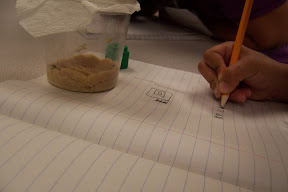Inquiry resources for early childhood teachers of science
By Peggy Ashbrook
Posted on 2010-12-31

 Does your (or your child’s) early childhood program include science inquiry experiences? Here are a few resources to get started, or to expand on, your understanding of science inquiry. These resources are on my list because I have read them (some—not all, yet), or other works by the authors, or read the reviews on NSTA Recommends or another source. I’m sure there are others—use the comment feature below to add your list to this one. Thanks to Nick dePreter, teacher who I met at his session at a NSTA conference, for asking a question which inspired this list. Online community–another great resource!
Does your (or your child’s) early childhood program include science inquiry experiences? Here are a few resources to get started, or to expand on, your understanding of science inquiry. These resources are on my list because I have read them (some—not all, yet), or other works by the authors, or read the reviews on NSTA Recommends or another source. I’m sure there are others—use the comment feature below to add your list to this one. Thanks to Nick dePreter, teacher who I met at his session at a NSTA conference, for asking a question which inspired this list. Online community–another great resource!
In print
- Building Structures with Young Children (Young Scientist Series) by Ingrid Chalufour and Karen Worth. 2004. St. Paul, MN: Redleaf Press.
- Growing and Changing by Robert E. Rockwell, E. Sherwood, R. Williams, and D. Winnett. 2001. While Plains, NY: Dale Seymour Publications. Activities for students to make observations and collect data in about themselves and other organisms.
- The Inquiry Matrix by Julie Grady. The Science Teacher, November 2010. Note that NSTA members can access all journals online.
- Investigating Real Data in the Classroom: Expanding Children’s Understanding of Math and Science by Richard Lehrer and Leona Schauble, eds. 2002. New York, NY: Teachers College Press. Education researchers and classroom teachers paired up to describe how children can collect and analyze data as they go about answering questions.
- More Picture Perfect Science Lessons: Using Children’s Books to Guide Inquiry, K-4 by Karen Ansberry and Emily Morgan. 2007. Arlington, VA: NSTA Press.
- The Pillbug Project: A guide to investigation by Robin Burnett. 1999 revised. Arlington, VA: National Science Teachers Association.
- Preschool Pathways to Science: Facilitating Scientific Ways of Thinking, Talking, Doing, and Understanding by Rochel Gelman and Kimberly Brenneman, Gay Macdonald, Moisés Roman. 2009. Baltimore, MD: Paul H Brookes Pub Co.
- Scaffolding Science Inquiry Through Lesson Design by Michael Klentschy and Laurie Thompson. 2008. Portsmoouth, NH: Heinemann. Note: written for teachers of grades 3-5.
- Science in Kindergarten by Ingrid Chalufour and Karen Worth, Reading #56 from the CD accompanying Developmentally Appropriate Practice in Early Childhood Programs Serving Children from Birth through Age 8, Third Edition by Carol Copple and Sue Bredekamp, eds. 2009. Washington, D.C.: National Association for the Education of Young Children.
- Science Is Golden: A Problem-Solving Approach to Doing Science with Children by Ann Finkelstein. 2001. East Lansing, MI: Michigan State University Press. For parents and teachers—how to guide children’s questions toward investigation, including gathering data.
- The Teaching of Science in Primary Schools by Wynne Harlen and Anne Qualter, 2009. London, Great Britain: David Fulton Publishers.
- Worms, Shadows, and Whirlpools: Science in the Early Childhood Classroom by Karen Worth and Sharon Grollman. 2003 Portsmouth, NH: Heinemann, Washington D. C.: NAEYC.
- A Head Start on Science: Encouraging a Sense of Wonder: 89 Activities for Children Ages 3-7 by William C. Ritz. 2007. Arlington, VA: NSTA Press.
- Outdoor Inquiries: Taking Science Investigations Outside the Classroom by Patricia McGlashan, Kristen Gasser, Peter Dow, David Hartney, and Bill Rogers. 2007. Portsmouth, NH: Heinemann. From the staff of First Hand Learning, Inc.
- Squishy, Squashy Sponges by Beverly Kutsunai, Susan Gertz, and Lynn Hogue. 2003. Middletown, OH: Terrific Science Press.
Online
- Annenberg, Learning Science Through Inquiry
http://www.learner.org/workshops/inquiry/videos.html?pop=yes&pid=1452
- The Cat in the Hat Know a Lot about That! Explorer’s Guide, on doing science with young children.
- Entries from a Staff Developer’s Journal . . .Helping Teachers Develop as Facilitators of Three- to Five-Year-Olds’ Science Inquiry by Robin Moriarty
http://cse.edc.org/products/pdfs/YCMoriarty.pdf
- Foundations, volume 2, Inquiry :Thoughts, Views, and Strategies for the K-5 Classroom
http://www.nsf.gov/pubs/2000/nsf99148/start.htm
- Exploratorium, Institute for Inquiry
http://www.exploratorium.edu/IFI/resources/index.html
- Inquiry Science in the Elementary Classroom: A Study Guide, from Educational Development Center, Inc.
http://cse.edc.org/products/inquiryscienceelemclassroom/inquiry.asp
- K2S Bitesize BBC Interpreting Data, site has ‘bitesized’ interactive learning content including on interpreting data using tally charts.
http://www.bbc.co.uk/schools/ks2bitesize/maths/data/
- National Association for the Education of Young Children (NAEYC), Teaching Young Children, Picturing Good Practice. You Can Count on Math Handout 2: Math-Related Children’s Books, Songs, and Finger Plays for Preschoolers
http://www.naeyc.org/files/tyc/file/BooksSongsandFingerPlays.pdf
- Science News for Kids, an online science news journal—a resource to learn age appropriate vocabulary and new science content.
http://www.sciencenewsforkids.org/articles/20101006/Note1.asp
- A Try Science Conversation with Wynne Harlen, author of The Teaching of Science in Primary Schools
http://scienceonline.terc.edu/harlen_conversation/index.html
- Understanding Science website, especially the Understanding Science 101 section
- Young Children’s Inquiry chart by Hubert Dyasi, CCNY; and Karen Worth, Education Development Center, Inc.
http://cse.edc.org/products/inquiryscienceelemclassroom/Inquiry.pdf
What resources can you add to this list? (Authors and publishers: don’t be shy!)
Peggy
Disclaimer: The views expressed in this blog post are those of the author(s) and do not necessarily reflect the official position of the National Science Teaching Association (NSTA).


